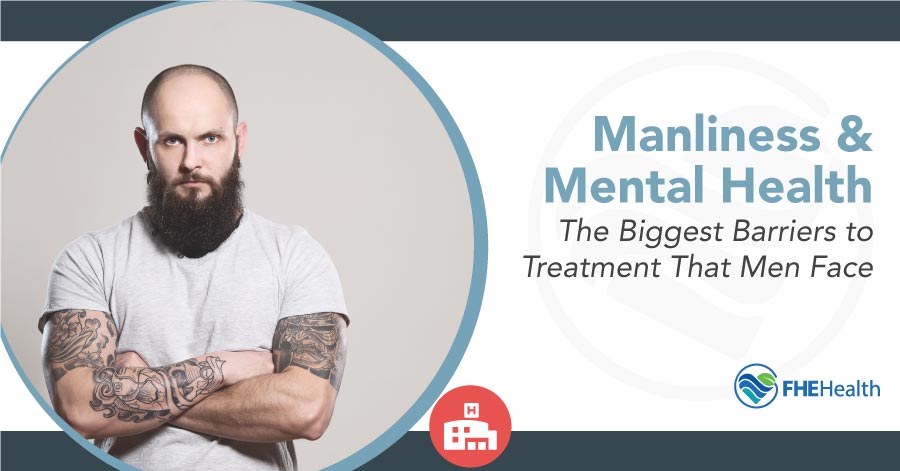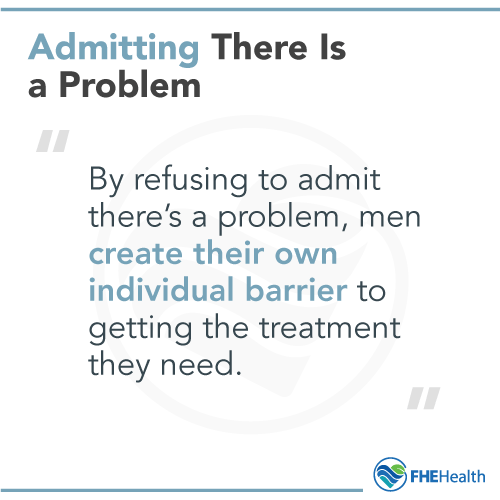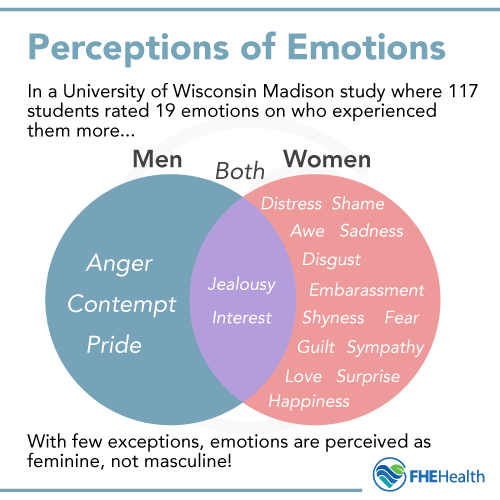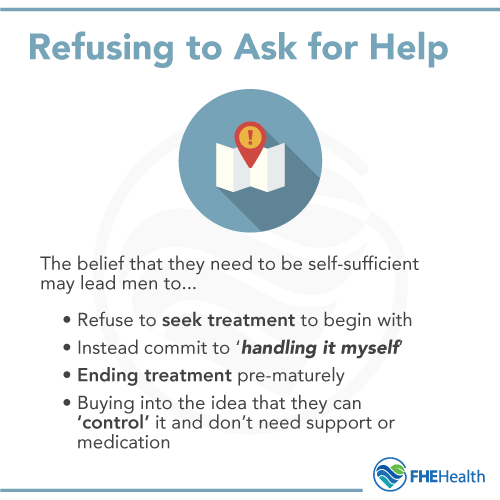
Both men and women engage in problem drinking and drug use, but statistics demonstrate that men do it more frequently than women. According to the Centers for Disease Control, “men are almost two times more likely to binge drink than women” and “among drivers in fatal motor-vehicle traffic crashes, men are almost twice as likely as women to have been intoxicated.” Regardless of gender, the sad truth is that more than 90% of individuals who need treatment for substance abuse or a dependency don’t get it. While women may face some gender-related barriers to getting substance abuse treatment, many men often struggle with some traditional stereotypes and conventional notions about masculinity that prevent them from seeking the help they need.
Problem? What Problem?
 While it’s not always helpful to speak in generalizations, substance abuse statistics illustrate that men generally don’t like to ask for help. To ask for help is to admit that there is a problem, a serious problem. Traditionally, men may feel that an inability to cope with a problem on their own is a sign of weakness, and this unfortunate notion has underscored a stigma of treatment for men. The aversion of perceived weakness is powerful. In fact, women are more likely to be referred to addiction treatment through their mental health therapist or counselor; men, however, are more likely to be forced to accept substance abuse treatment by the criminal justice system.
While it’s not always helpful to speak in generalizations, substance abuse statistics illustrate that men generally don’t like to ask for help. To ask for help is to admit that there is a problem, a serious problem. Traditionally, men may feel that an inability to cope with a problem on their own is a sign of weakness, and this unfortunate notion has underscored a stigma of treatment for men. The aversion of perceived weakness is powerful. In fact, women are more likely to be referred to addiction treatment through their mental health therapist or counselor; men, however, are more likely to be forced to accept substance abuse treatment by the criminal justice system.
One of the first things an addiction counselor or professional therapist will explain to clients is that strength and weakness aren’t tenets of addiction. Substance addiction is a disease, a chronic condition that affects people all over the world. Anyone can become addicted given the ‘right’ circumstances. By refusing to admit there’s a problem, men create their own individual barrier to getting the treatment they need.
But Women Are the Emotional Ones
All humans are emotional creatures but women have been traditionally viewed as the emotional sex. Displaying these emotions may actually have served women well since bottling them up and failing to cope with them in a healthy manner is a major risk factor for substance abuse. Negative emotions like anger, fear, and sadness are often triggers for substance abuse—and are often triggers for relapse. During addiction counseling, individuals will spend a considerable amount of time learning to cope with negative emotions. Drinking and drug use can be a way of ‘self-medicating’ in an attempt to assuage stress and negative feelings, but establishing this behavior as a pattern can pave a path to addiction.
Shame and Embarrassment
 Men may feel too ashamed or embarrassed about their drinking or drug use problem to ask for help. Again, that notion of mental health issues and weakness has permeated male culture and is a serious barrier to recovery. Many men aren’t comfortable admitting they have a problem to a professional healthcare provider—and many still aren’t comfortable admitting they have a problem with drinking or drugs to family members or friends. This shame may also extend to some of the behaviors that men may engage in while under the influence of an addictive substance. Yet, by refusing to deal with the shame and embarrassment they feel, they wind up perpetuating the problem—and the cycle of abuse continues.
Men may feel too ashamed or embarrassed about their drinking or drug use problem to ask for help. Again, that notion of mental health issues and weakness has permeated male culture and is a serious barrier to recovery. Many men aren’t comfortable admitting they have a problem to a professional healthcare provider—and many still aren’t comfortable admitting they have a problem with drinking or drugs to family members or friends. This shame may also extend to some of the behaviors that men may engage in while under the influence of an addictive substance. Yet, by refusing to deal with the shame and embarrassment they feel, they wind up perpetuating the problem—and the cycle of abuse continues.
Responsibilities
Traditional gender roles regarding work also impact men’s decision to forgo or put off treatment. Traditionally, men have been the primary breadwinners for their families, and while that has changed dramatically in the past several decades, many men are still loathe to take time away from their careers to seek professional treatment. They may worry that their employer will look differently at them—possibly even overlook them when it comes to promotion. Many men feel that taking time away from work is risking their livelihood, which is a decided barrier to treatment. Unfortunately, continuing to abuse drugs or alcohol is also a risk to not just their jobs—but their health as well.
The DIY Approach to Treatment
Another obstacle that prevents men from seeking treatment—they think they can handle the problem themselves. Men may tell themselves for months, even years, that they are in control of their drinking or drug use. They may think they can cut down on their alcohol or drug consumption whenever they like. In fact, they might even do so for a few weeks. However, many commonly abused substances are highly addictive and the DIY approach to abuse and addiction invariably fails without professional assistance.
Misinformation and Misunderstanding
Many men believe that they know what goes on in rehab and they “don’t need that kind of help.” Misunderstanding and misinformation frequently prevent men from entering a treatment program. Without speaking with addiction specialists, many men will continue to misunderstand what addiction is as well as how it can be successfully managed with treatment. Moreover, there are many different types of treatment options available that men may never have heard of—options that could be just right for their needs.
Overcoming the Barriers
 So many of these barriers can be alleviated with just a visit or two to a treatment center. For instance, therapists at FHE Health understand what many men feel when they initially enter treatment and so, right from the start, they strive to educate clients about the true nature of addiction—how it’s not a matter of weakness or something to feel ashamed about. After learning that substance addiction is a multi-faceted condition that requires multi-type treatment, many men feel relieved when presented with the facts about this chronic disease.
So many of these barriers can be alleviated with just a visit or two to a treatment center. For instance, therapists at FHE Health understand what many men feel when they initially enter treatment and so, right from the start, they strive to educate clients about the true nature of addiction—how it’s not a matter of weakness or something to feel ashamed about. After learning that substance addiction is a multi-faceted condition that requires multi-type treatment, many men feel relieved when presented with the facts about this chronic disease.
Women are more inclined to seek out help from a mental healthcare provider like FHE Health because it tends to bother them less to talk about their problems; many innately understand that talking about their problems makes them feel better. It may take men a bit longer to feel comfortable talking about their problems or negative emotions, but the need to do so is great. By opening up to treatment, men can successfully manage their substance addictions and prevent relapse.
It’s not weak to get sick. When you get sick, you go to the doctor. It’s the same with an abuse or substance disorder. It’s a sickness, but a qualified treatment center like FHE Health can help. If you or a loved one is suffering from a dependency on drugs or alcohol, contact FHE Health. Explore your options. Get to know what treatment is available. Asking for help is the key to beginning your recovery journey.






